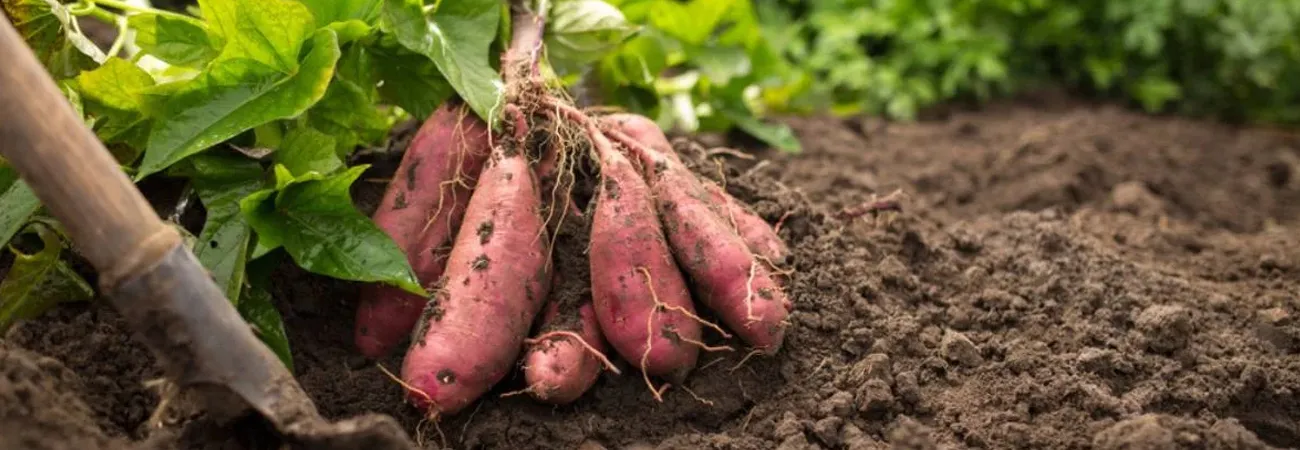i ECONOMY
Pakistan’s economy is struggling and needs a cheap and efficient fuel to run its industries and vehicles. Ethanol, a low-cost but powerful fuel, can be produced from the starchy roots of sweet potato. Sweet potato (Ipomoea batatas) is a plant from the morning glory flower family that can grow in both loam and sandy soils. However, it is not widely cultivated in Pakistan. Naveed Ahmad, Assistant Director of the Directorate of Floriculture (T&R) Punjab, Lahore, shared his views on sweet potato farming in Pakistan with WealthPK. Biofuel production from sweet potato can be beneficial, but it also faces some challenges. For instance, a small-scale farmer cannot set up a biofuel plant independently, and would need the support of large-scale farming or the government. Moreover, the automated systems for biofuel processing may need some adjustments, but no studies have been done on this aspect yet.
“If the government helps the growers, we can market biofuel internationally for sustainable earning. There may be a few problems at the outset but afterward these can be overcome by adopting good policies,” he said. Talking to WealthPK about the distillation of ethanol and its economic value, businessman and chemist Mumtaz Hussain Mian said that dried chunks or flour of sweet potato are used for ethanol extraction. The flour or dried small pieces of sweet potato are boiled in water. After boiling, specific enzymes are added to convert the resulting starch to sugar. It is then fermented to prepare alcohol and distil ethanol.
“Sweet potato can be called an attractive raw material to extract ethanol for industrial use. At least 4,800 litres of ethanol can be extracted from a hectare of sweet potato field,” he added. “The plant for ethanol extraction is expensive but it can be installed with government’s cooperation if sweet potato farming is done on a cluster basis. The corporate sector must consider this type of profit-oriented product. It is true that currently, this type of fuel is not popular in Pakistan but it can be exported to earn good profits,” he explained. Dr. Riffat Tahira, Principal Scientific Officer and Program Leader of the National Medicinal, Aromatic Plants, and Herbs Program of the Pakistan Agricultural Research Council (PARC), told WealthPK that sweet potato is mostly used in Pakistan to prepare ‘chaat’, a traditional savoury food. We do not cook it as a vegetable like in other countries. If cultivated in Pakistan, it can give surplus production. Its crop does not require too much care, protective sprays, or fertilizers and gives a good yield. It is important to raise farmers’ awareness so that our sandy lands can be brought under cultivation.
“The government’s coordination or joint efforts of the community for installation of ethanol extraction plants is more than beneficial for our agriculture sector. If we install these plants, people will obviously start growing sweet potato to get more economic benefits,” said Dr. Riffat. Ethanol-blended fuels are widely used in many countries, i.e., China, the United States, Brazil, Europe. In these countries, it is blended with regular fuel (according to the government’s recommended standards), while in some flexible vehicles, 100 ethanol is used. Brazil has been using ethanol-blended fuel (E25) since 1976, while neat ethanol fuel known as E100 is also used there.
Bioethanol is also a form of renewable energy that can be easily produced through feedstock or crops, e.g., corn, potato/potato peel, sweet potato, sugarcane, hemp. According to the fruit, vegetables, and condiments statistics of Pakistan 2021-2022, sweet potato was cultivated over an area of 9,727 hectares. The area of cultivation was less than it was in 2018-2019. If the farmers had been aware of its nutritious value and other value additions, its cultivation would have flourished. Pakistan needs to improve its coordination with China for sweet potato cultivation and ethanol extraction plants. In the year 2022, two leading ethanol-producing Chinese companies — ‘SDIC Jilin Alcohol’ and ‘Henan Tianguan’ — were estimated to have produced 887 million litres of ethanol.
Both the companies use cassava, wheat, or corn as feedstock. The international ethanol market reached a value of US$99.06 billion and is expected to be worth US$161.12 billion by 2032 at a Compound Annual Growth Rate (CAGR) of 5.1%. With a little focus, Pakistan can join the ranks of ethanol producing countries to meet its domestic needs and export the surplus fuel.
Credit: Independent News Pakistan (INP)









